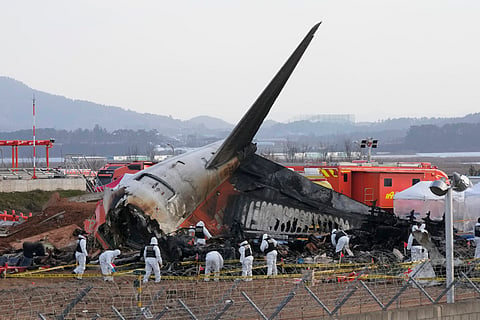

South Korean authorities began releasing the bodies of plane crash victims to families on Tuesday, as investigators worked urgently to determine why the Jeju Air Boeing 737-800 crash-landed and burst into flames.
U.S. investigators, including experts from Boeing, have arrived at the crash site in southwestern Muan, officials said. Meanwhile, South Korean authorities are analyzing two black boxes recovered from the charred wreckage of the aircraft.
The plane was carrying 181 people from Thailand to South Korea when it issued a mayday call and belly-landed before crashing into a barrier and erupting in flames. Tragically, all aboard Jeju Air Flight 2216 were killed, except for two flight attendants who were rescued from the wreckage.
South Korea is observing a seven-day mourning period, with flags flying at half-mast.
Acting President Choi Sang-mok, who has been in office since Friday, described the disaster as a "turning point" for the country, calling for a comprehensive overhaul of air safety systems.
He urged officials to "thoroughly reexamine the overall aircraft operation system... and immediately address any necessary improvements."
"Today marks the final day of 2024," Choi said on Tuesday, encouraging citizens to "reflect on the past year and prepare for the new one."
"I am well aware that whenever challenges arose, both domestically and internationally, all citizens and public officials united with one heart and mind to overcome these crises," he added.
At Muan Airport, investigators examined the wrecked fuselage, while soldiers carefully searched the fields surrounding the airport. Meanwhile, mourners left ritual offerings for the victims such as food and heartfelt letters near the airport's perimeter.
"Captain, first officer, and crew members, thank you so much for doing your best to save the passengers. I pray for your eternal rest," read one letter placed on the fence.
Inside the airport, where families of the victims have been gathered since Sunday, frustrations were mounting over delays in identifying those aboard the ill-fated flight.
Despite these challenges, officials confirmed that they had begun releasing some of the victims’ remains to their families.
"Of the 179 victims, the bodies of four have completed the handover procedures to their bereaved families for funerals," Transport Minister Park Sang-woo said at Muan Airport on Tuesday.
"For 28 victims whose identities have been confirmed and autopsies completed, we will allow funeral procedures to begin from 2 pm (0500 GMT) today with the consent of their families," he added.
One family tragically lost nine members, including the plane's oldest passenger, who was on his first overseas trip to celebrate his birthday, according to local broadcaster KBC.
The passenger, surnamed Bae, was traveling with his wife, two daughters, one son-in-law, and four grandchildren, including a five-year-old. The entire family perished, leaving only one of the daughters’ husbands who was unable to join the trip to grapple with the loss of his wife and children.
"Yesterday, the village chief went to Muan Airport and said the son-in-law was in utter despair, saying, 'I should have gone with them and died with them,'" KBC reported.
Memorial altars for the victims have been set up nationwide, including in Seoul. Families at Muan Airport oversaw the setup of a new altar on Tuesday, with black-and-white funeral flowers filling the area.
Authorities are expected to provide a fuller account of the crash after analyzing the black boxes.
"Regarding the black box, surface contamination cleaning has been completed at the testing and analysis center, and its condition is currently being assessed," said Deputy Civil Aviation Minister Joo Jong-wan.
"However, the flight data recorder's data storage unit is still under evaluation," he added, noting that it was found with a missing connector. Technical reviews are underway to determine how to extract the data.